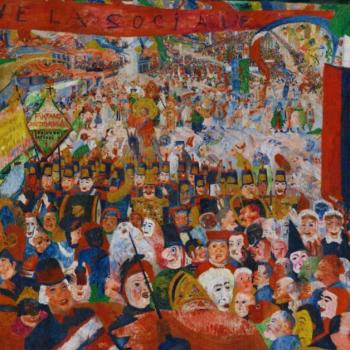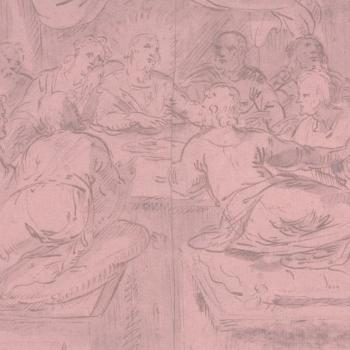
You’ve heard it said, ‘The death of God’
But now I tell you, ‘The death of philosophical Atheism.’
In 1966 Time Magazine asked, “Is God Dead?” via Thomas Altizer, William Hamilton and Paul van Buren. This came several months after Time had explored the question of whether or not theologians of the 1960s were trying to write God out of theology. The 1966 issue wondered if God was still a viable option for agency when science, secularism, and modern philosophy seemed to eliminate the need for a moral God who runs everything from the sky. Between these two issues, only several months apart, the outrage of wholesome, religions America, and the hope of the death of God theologians to make metaphysics an irrelevant matter on both sides, had the God on high indeed died, and what did this mean? Has it, indeed, resulted in the death of God for all involved? Was it now a matter of Atheism and its dead God?
Decades later, Gianni Vattimo, in his book, After Christianity, explores the question of “whether and to what extent the end of all possible religious experience constitutes the implication of what Nietzsche calls the death of God (or the overcoming o the moral God), which in contemporary thought has been described as the end of metaphysics.”[1] It’s an important question because if we have moved past the need (and even illusion) of a moral God, the underlying consciousness of all things, agency, and ground of being, then Atheism has also become obsolete, useless completely unnecessary.
Atheism, especially New Atheism with its ant-God squad, enter Richard Dawkins et al., has been long tired; Tired, dull, and a total snooze. Yet when we take the metaphysical God off the table, Atheists haven’t much to talk about. All that is left is Atheism and its dead God. John Caputo says of Atheism and its dated conversation, “The atheists are trying to break down a door that is already wide open in radical theology, so if you lead a charge like that you will end up flat on your face. The debate between the theists and the atheists is futile. It proves nothing, because they are arguing about nothing, literally.”[2]
When the teleological God has become outmoded, and not by its counter-parts like Atheism and philosophical Foundationalism, but by itself, the metaphysical God has closed in on itself and collapsed in what Vattimo calls an increasingly “Babel-like pluralism of late-modern society”,[3] we have no need of debunking narratives.
Vattimo says, “once we acknowledged that, at the end of metaphysics, we have no ground for unmasking the truth hidden in our myths and ideologies because we have discovered that the belief in an ultimate truth is a myth and that the very idea of unmasking of ideologies is an ideology itself….”[4]
So, the Death of God theologians, the Radical Theologians, tell the Atheists-it’s over! Your arguments are irrelevant because the God you’ve long sought to expose as farce no longer lives. This God endures no more. So, what of your tired conversations now? Vattimo says, “The end of metaphysics and the death of the moral God have liquidated the philosophical basis of atheism.”[5] Indeed, it has!
Each side has rendered the other totally and completely superfluous. So, what is the question now? Where do we go from here? And are there any questions to be had of god, religions, and faith that might be viable at all?
The short answer is YES!
The death of god and the end of metaphysics isn’t an invitation for a reality in which the opposite is now certain and absolute! No! That is just a different side of the same coin! “It is an event that transforms the existence of the person who receives the announcement—or which is entirely constituted by this transformation.”[6]
In other words, we can actually start talking about things that really matter, that position us for transformation and renewal, and free us from constraints forced upon us by objective reasoning and master narratives. Somehow this release from metaphysical religion, both for and against, has thrust us into a time in which interest in religion is growing more than ever.
Why is this? At the very least, unexpected things happen in the wake of liberation. And what no one anticipated but the OGs of the DoG hoped and longed for is happening. “The death of the moral God has paved the way for the renewal of religious life.” And even more than “religious life,”[7] an opening to event, occurrence, and reoccurrence.
Vattimo says if there is a conversation to have about Being it is not one of “objective order” but one that “only tells us that Being is neither objective nor stable. Being manifests itself as event with respect to which we are always engaged as interpreters somehow “on the way.””[8]
The surprise for those who were deeply outraged in 1966, is that the issue they took offense to, God’s death, has brought the world to a new conversation on god, religion and faith. A better one, a more transformative one.
But it is all wrapped up in a wager, a risk, and an invitation to make our religious and philosophical homes in uncertainty; in shifting horizons and strange seas, not in ways that are relativistic, pluralistic, or even liberal. As if any of that would be enough. All of this still lives in the land of ideology, myth, and what Vattimo warns would be a “simple return…without setting up any critical principle.”[9] This is the key-the “critical principle.” The return of religion “inescapably putting itself in question”[10] to be experienced, evaluated, evented, and evaporated until it returns with eagerness once more.
The Atheist conversation is fatally subverted when the metaphysical God is dead, when relativism is bypassed for the weak liberal quick fix it is, and we are free to engage religion that has been liberated from the shackles of certainty.
A tall order? Perhaps.
But we have a lifetime to pursue it endlessly.
This is, perhaps, a religion without end, one that transcends our knowledge bases (un)safe in their comfort, predictability, and power.
So, when we declare God is dead, we also declare Atheism is dead-and we are free to pursue god, being, and religion in ways it only ever dreamed of, and us too.
[1] Gianni Vattimo, After Christianity, trans. Luca D’Isanto (New York: Columbia University Press, 2002), 12.
[2] John Caputo, The Folly of God: A Theology of the Unconditional. (Salem: Polebridge Press, 2016)11.
[3] Vattimo, After Christianity, 15.
[4] Ibid, 20.
[5] Ibid, 17.
[6] Ibid, 13.
[7] Ibid, 15.
[8] Ibid, 22.
[9] Ibid, 20.
[10] Ibid, 20.













